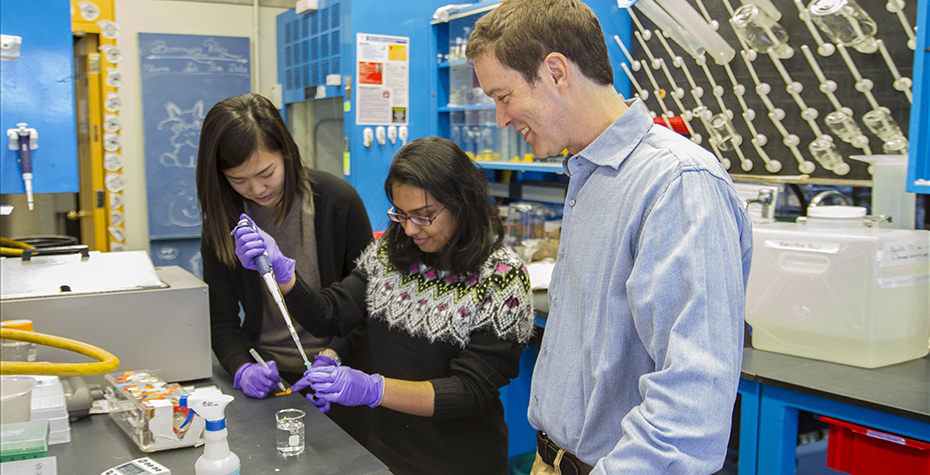Marc Tetel of Neuroscience Shares Insights with the Journal Endocrinology on Being a Scientist at a Selective Liberal Arts College

Wellesley’s Class of 1966 Associate Professor of Neuroscience Marc Tetel recently published an article in the journal Endocrinology about working at a liberal arts college as a career option for research scientists. The editor-in-chief of the flagship journal of the Endocrine Society invited Tetel to write the article, “Rewards and Challenges of a Career in Research and Teaching at a Liberal Arts College.”
“Given that the Endocrine Society is very medical school oriented,” says Tetel, “I was pleasantly surprised and honored that I was asked to write about working at a liberal arts college.”
In the article, he offers advice to peers and newly minted Ph.D.s weighing the traditional pursuit of a tenure-track position at a high-powered research university (with multiple projects funded by federal grants) versus… alternative careers. One of these nontraditional routes is joining the faculty at a liberal arts college.
Tetel outlines some of the challenges (e.g., teaching well is hard work) and rewards (e.g., teaching well can be extremely gratifying), and gives examples from his own experience. For instance, regarding conducting research with undergraduates, he concedes that they require more up-front training and have less time in the lab due to their course load, but, he writes:
I have found that if one gives a motivated undergraduate the proper guidance and ownership of his/her research project, he/she can demonstrate tremendous commitment and drive in that project. I have known students to work entire weekends, postpone flights home, and work till the morning of their graduation to complete their projects. It is a joy to bring these students to the Endocrine Society and other international meetings to present their research at the poster sessions and have colleagues ask me if they are graduate students. For a true example of a liberal arts student, a student from my laboratory (who was a double major in French) presented her entire poster in French to a Belgian colleague, who was thoroughly impressed. A wonderful benefit of this job is watching these undergraduates develop into confident scientists who can think critically.
For a true example of liberal arts faculty, Wellesley’s Jean Glasscock Professor of Sociology Jonathan Imber read Tetel’s article when it first appeared and was moved to write to some of his colleagues to bring their attention to what he called a “mission statement” for teaching—particularly science—at a liberal arts college. He says, “Marc’s testimony reminds me of a study done, now nearly three decades ago, that reported on the disproportionate number of liberal arts colleges (as compared to large universities) producing graduates who went on to study science. Wellesley was outstanding in this regard with respect to women going into science. It is obvious with colleagues like Marc and many others, we still have a very good thing going.”
Tetel’s lab has received NIH funding (which he points out in the article can be a challenge or at least a less familiar process at smaller institutions), and it is currently investigating how estrogens and progesterone act in the brain to regulate behavior, including feeding. This research may provide insights into obesity and hormone mechanisms involved in breast cancer. He is also teaching two practicums in NEUR100: An Introduction to Neuroscience this semester, which provides neuroscience majors and non-science majors alike a broad introduction to the field via lecture and experimentation, focusing on examples and approaches from cellular and molecular, cognitive, behavioral, systems, and computational neuroscience. Last semester he taught two 300-level courses, Neuroendocrinology with Laboratory and a Capstone Seminar in Neuroscience; in these, students explore how hormones act in the brain to regulate a variety of functions, and write National Institutes of Health grants proposals, respectively. Over the 2015 Wintersession he gave a lecture called From Decisionmaking to Dealmaking: How Hormones Influence Our Brains and Behavior, introducing the concept of neuroeconomics to fellows at the Madeleine K. Albright Institute for Global Affairs.
In closing the article for Endocrinology, he summarizes: “Being a science faculty member at a liberal arts college is for those who have a passion for teaching, want to engage students in research in the laboratory, enjoy mentoring college students, appreciate crossing disciplinary boundaries and interacting with colleagues in other non-science departments, and enjoy a sense of college community.”
Tetel embodies that description pretty thoroughly himself. He calls himself lucky in the strong mentors he has had who’ve taught him how to appreciate science, work hard, enjoy asking questions, and even maintain work-family balance, and aims to pass that along. “I try to create an environment where students can explore what it means to be a scholar, test their potential, and learn to ask questions about science and about what they want out of life,” he says. He admires the serious approach that Wellesley students take to their education, and the fact that they seem to truly appreciate the opportunities they have here. But, he says, “My favorite part of working with Wellesley students is watching how much they grow and develop as scholars, in the classroom and in my lab.… I love seeing the transformation that occurs—not just the maturity that has taken place, but also the intellectual depth that our students gain during their four years here.”
